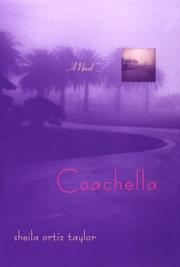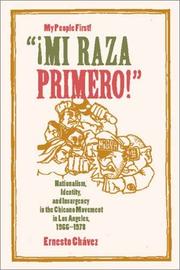| Listing 1 - 10 of 11 | << page >> |
Sort by
|
Book
ISBN: 0813562864 9781461958345 1461958342 9780813562865 9780813562858 0813562856 9780813562841 0813562848 Year: 2013 Publisher: New Brunswick, New Jersey
Abstract | Keywords | Export | Availability | Bookmark
 Loading...
Loading...Choose an application
- Reference Manager
- EndNote
- RefWorks (Direct export to RefWorks)
In Daughters and Granddaughters of Farmworkers, Barbara Wells examines the work and family lives of Mexican American women in a community near the U.S.-Mexican border in California's Imperial County. Decades earlier, their Mexican parents and grandparents had made the momentous decision to migrate to the United States as farmworkers. This book explores how that decision has worked out for these second- and third-generation Mexican Americans. Wells provides stories of the struggles, triumphs, and everyday experiences of these women. She analyzes their narratives on a broad canvas that includes the social structures that create the barriers, constraints, and opportunities that have shaped their lives. The women have constructed far more settled lives than the immigrant generation that followed the crops, but many struggle to provide adequately for their families. These women aspire to achieve the middle-class lives of the American Dream. But upward mobility is an elusive goal. The realities of life in a rural, agricultural border community strictly limit social mobility for these descendants of immigrant farm laborers. Reliance on family networks is a vital strategy for meeting the economic challenges they encounter. Wells illustrates clearly the ways in which the "long shadow" of farm work continues to permeate the lives and prospects of these women and their families.
Book
ISBN: 9780822345558 9780822345640 Year: 2009 Publisher: Durham Duke University Press
Abstract | Keywords | Export | Availability | Bookmark
 Loading...
Loading...Choose an application
- Reference Manager
- EndNote
- RefWorks (Direct export to RefWorks)
Authors, American --- Lesbians in literature --- Mexican American lesbians --- Mexican Americans in literature --- Mexican American women authors --- Women authors, Mexican American --- Women authors, American --- Chicana lesbians --- Lesbians, Mexican American --- Lesbians --- American authors --- Social ethics --- Anzaldúa, Gloria --- Feminism --- Theory --- Book --- Courses

ISBN: 0826327311 0585188556 0826318436 9780585188553 9780826318435 9780826327314 Year: 1998 Publisher: Albuquerque, N.M. University of New Mexico Press
Abstract | Keywords | Export | Availability | Bookmark
 Loading...
Loading...Choose an application
- Reference Manager
- EndNote
- RefWorks (Direct export to RefWorks)
This desert mystery novel, set in Palm Springs in 1983, is from one of Chicana literature's finest writers.
Mexican Americans --- AIDS (Disease) --- Mexican American lesbians --- Patients --- Coachella Valley (Calif.) --- Chicana lesbians --- Lesbians, Mexican American --- Lesbians --- Fiction. --- Acquired immune deficiency syndrome --- Acquired immunodeficiency syndrome --- Acquired immunological deficiency syndrome --- HIV infections --- Immunological deficiency syndromes --- Virus-induced immunosuppression --- FICTION --- General. --- Fiction --- Metafiction --- Novellas (Short novels) --- Novels --- Stories --- Literature --- Novelists --- Philosophy
Book
ISBN: 0813594545 0813594561 9780813594545 9780813594569 9780813594538 9780813594521 0813594537 9780813594538 0813594529 9780813594521 Year: 2018 Publisher: [Place of publication not identified]
Abstract | Keywords | Export | Availability | Bookmark
 Loading...
Loading...Choose an application
- Reference Manager
- EndNote
- RefWorks (Direct export to RefWorks)
Bringing Chicana/o studies into conversation with queer theory and transgender studies, Post-Borderlandia examines why gender variance is such a core theme in contemporary Chicana and Chicanx narratives. It considers how Chicana butch lesbians and Chicanx trans people are not only challenging heteropatriarchal norms, but also departing from mainstream conceptions of queerness and gender identification. Expanding on Gloria Anzaldúa's classic formulation of the Chicana as transformer of the "borderlands," Jackie Cuevas explores how a new generation of Chicanx writers, performers, and filmmakers are imagining a "post-borderlands" subjectivity, where shifting national, racial, class, sexual, and gender identifications produce complex power dynamics. In addition, Cuevas offers fresh archival analysis of the Chicana feminist canon to reveal how queer gender variance has always been crucial to this literary tradition.
Gender identity in literature. --- American literature --- History and criticism. --- Mexican American authors --- Adelina Anthony. --- Chicana. --- Chicano. --- Chicanx. --- Felicia Luna Lemus. --- Gloria Anzaldua. --- Helena Maria Viramontes. --- Jovita Gonzalez. --- binary. --- butch. --- female. --- feminist. --- gender queerness. --- gender. --- identity. --- lesbian. --- literary. --- literature. --- masculine. --- queer. --- sex. --- transgender. --- variance.

ISBN: 0292709714 0292796250 Year: 2006 Publisher: University of Texas Press
Abstract | Keywords | Export | Availability | Bookmark
 Loading...
Loading...Choose an application
- Reference Manager
- EndNote
- RefWorks (Direct export to RefWorks)
With the 1981 publication of the groundbreaking anthology This Bridge Called My Back: Writings by Radical Women of Color, Cherríe Moraga and Gloria Anzaldúa ushered in an era of Chicana lesbian writing. But while these two writers have achieved iconic status, observers of the Chicana/o experience have been slow to perceive the existence of a whole community-lesbian and straight, male as well as female-who write about the Chicana lesbian experience. To create a first full map of that community, this book explores a wide range of plays, novels, and short stories by Chicana/o authors that depict lesbian characters or lesbian desire. Catriona Rueda Esquibel starts from the premise that Chicana/o communities, theories, and feminisms cannot be fully understood without taking account of the perspectives and experiences of Chicana lesbians. To open up these perspectives, she engages in close readings of works centered around the following themes: La Llorona, the Aztec Princess, Sor Juana Ines de la Cruz, girlhood friendships, rural communities and history, and Chicana activism. Her investigation broadens the community of Chicana lesbian writers well beyond Moraga and Anzaldúa, while it also demonstrates that the histories of Chicana lesbians have had to be written in works of fiction because these women have been marginalized and excluded in canonical writings on Chicano life and experience.
Lesbians' writings, American --- American literature --- Mexican American lesbians --- Mexican American women --- Women and literature --- Mexican American women in literature. --- Mexican Americans in literature. --- Lesbians in literature. --- History and criticism. --- Mexican American authors --- Women authors --- Intellectual life. --- Literature --- Chicana lesbians --- Lesbians, Mexican American --- Lesbians --- English literature --- Agrarians (Group of writers)
Book
ISBN: 9788498366150 8498366151 Year: 2009 Publisher: Granada Comares
Abstract | Keywords | Export | Availability | Bookmark
 Loading...
Loading...Choose an application
- Reference Manager
- EndNote
- RefWorks (Direct export to RefWorks)
Theory of literary translation --- Spanish-American literature --- Sociolinguistics --- United States --- Mexico --- Mexican American women authors --- Mexican American literature (Spanish) --- Literatura chicana --- Identidad cultural --- Mexican American literature (Spanish). --- Mexican American women authors. --- Criticism and interpretation. --- Translations into English. --- Traducciones. --- En la literatura. --- #KVHA:Vertaalwetenschap; Spaans --- #KVHA:Literair vertalen; Spaans --- #KVHA:Identiteit --- #KVHA:Chicanos --- American literature --- Mexican Americans --- English literature --- Agrarians (Group of writers) --- Mexican American authors&delete& --- History and criticism --- Intellectual life --- Mexican American authors --- United States of America
Book
ISBN: 1771122994 1771123028 177112301X 1771122986 9781771122993 9781771122979 1771122978 9781771122986 9781771123013 9781771123020 1771123001 9781771123006 Year: 2017 Publisher: Waterloo, Ontario, Canada
Abstract | Keywords | Export | Availability | Bookmark
 Loading...
Loading...Choose an application
- Reference Manager
- EndNote
- RefWorks (Direct export to RefWorks)
Space Between Her Lips presents the first selected works of one of Canada's most important poets of the last few decades. Margaret Christakos writes vibrant, exciting, and intellectually challenging poetry. She plays language games that bring a probing and disturbing humour to serious themes that range from childhood and children to women in contemporary techno-capitalist society to feminist literary theory, and so much more. Gregory Betts' introduction to the collection highlights her formal diversity and her unique combination of feminist and avant-garde affinities. He connects the geographies of her life - including Northern Ontario where she was raised, downtown Toronto where she studied with cutting-edge authors and artists like bpNichol and Michael Snow, and Montreal where she integrated with the country's leading feminist authors and thinkers - with her polyphonic experimentation. While traversing the problem of bifurcated identities, Christakos is funny at a deeply semiotic level, wickedly wry, exposing something about the way we think by examining the way we speak of it. In her afterword, Christakos maps out a philosophy of writing that highlights her self-consciousness of the foibles of language but also deep concern for the themes she writes about, including her career-length exploration of self-discovery, hetero-, queer and bi-sexual sexualities, motherhood, self-care, and linguistic alienation. Indeed, Margaret Christakos is a whole-body poet, writing with the materiality of language about the movement of interior thought to embodied experience in the world.
Indians of North America --- Canadian literature --- American literature --- Indian literature (American) --- Indian literature (Canadian) --- Indian authors. --- Poetry (Poetic Works By One Author) --- Poetry --- Poetry (poetic works by one author) --- Canadian poetry --- Chicana/o authors. --- Indigenous digital storytelling. --- Indigenous languages. --- Indigenous stories. --- Turtle Island. --- centreing Indigenous knowledges. --- fantasy. --- literary method. --- literary sovereignty. --- nationhood. --- new media. --- oral and written forms of expression. --- politics of translation. --- relations between land, language, community. --- science fiction. --- storytelling and writing.
Book
ISBN: 1477322000 Year: 2021 Publisher: Austin, Texas : University of Texas Press,
Abstract | Keywords | Export | Availability | Bookmark
 Loading...
Loading...Choose an application
- Reference Manager
- EndNote
- RefWorks (Direct export to RefWorks)
In the late 1960s, the American city found itself in steep decline. An urban crisis fueled by federal policy wreaked destruction and displacement on poor and working-class families. The urban drama included religious institutions, themselves undergoing fundamental change, that debated whether to stay in the city or move to the suburbs. Against the backdrop of the Black and Brown Power movements, which challenged economic inequality and white supremacy, young Latino radicals began occupying churches and disrupting services to compel church communities to join their protests against urban renewal, poverty, police brutality, and racism. Apostles of Change tells the story of these occupations and establishes their context within the urban crisis; relates the tensions they created; and articulates the activists' bold, new vision for the church and the world. Through case studies from Chicago, Los Angeles, New York City, and Houston, Felipe Hinojosa reveals how Latino freedom movements frequently crossed boundaries between faith and politics and argues that understanding the history of these radical politics is essential to understanding the dynamic changes in Latino religious groups from the late 1960s to the early 1980s.
Radicalism --- Urban renewal --- Hispanic Americans --- Church buildings --- Protest camps --- Church and social problems --- Christianity and politics --- Religious aspects --- Christianity --- History --- Social aspects --- Political activity --- Secular use --- barrio, Mexican American history, Mexican American, Latino, activism, civil rights, radical politics, religion, Latino faith, Mexican American Youth Organization, Young Lords, immigrant rights, advocacy, community organizing, Houston, Politics, Latina, Latinx, Chicano, Chicana, Chicanx, Church, Texas, History, US History, American History, American Studies.
Book
ISBN: 9781477322000 1477322000 9781477321980 1477321985 Year: 2021 Publisher: Austin
Abstract | Keywords | Export | Availability | Bookmark
 Loading...
Loading...Choose an application
- Reference Manager
- EndNote
- RefWorks (Direct export to RefWorks)
In the late 1960s, the American city found itself in steep decline. An urban crisis fueled by federal policy wreaked destruction and displacement on poor and working-class families. The urban drama included religious institutions, themselves undergoing fundamental change, that debated whether to stay in the city or move to the suburbs. Against the backdrop of the Black and Brown Power movements, which challenged economic inequality and white supremacy, young Latino radicals began occupying churches and disrupting services to compel church communities to join their protests against urban renewal, poverty, police brutality, and racism. Apostles of Change tells the story of these occupations and establishes their context within the urban crisis; relates the tensions they created; and articulates the activists' bold, new vision for the church and the world. Through case studies from Chicago, Los Angeles, New York City, and Houston, Felipe Hinojosa reveals how Latino freedom movements frequently crossed boundaries between faith and politics and argues that understanding the history of these radical politics is essential to understanding the dynamic changes in Latino religious groups from the late 1960s to the early 1980s.
Radicalism --- Urban renewal --- Hispanic Americans --- Church buildings --- Protest camps --- Church and social problems --- Christianity and politics --- Religious aspects --- Christianity --- History --- Social aspects --- Political activity --- Secular use --- barrio, Mexican American history, Mexican American, Latino, activism, civil rights, radical politics, religion, Latino faith, Mexican American Youth Organization, Young Lords, immigrant rights, advocacy, community organizing, Houston, Politics, Latina, Latinx, Chicano, Chicana, Chicanx, Church, Texas, History, US History, American History, American Studies.

ISBN: 0520935969 9786612762536 1282762532 1597347485 9780520935969 1417523883 9781417523887 9781597347488 9780520230170 0520230175 9780520230187 0520230183 6612762535 9781282762534 Year: 2002 Publisher: Berkeley University of California Press
Abstract | Keywords | Export | Availability | Bookmark
 Loading...
Loading...Choose an application
- Reference Manager
- EndNote
- RefWorks (Direct export to RefWorks)
¡Mi Raza Primero! is the first book to examine the Chicano movement's development in one locale-in this case Los Angeles, home of the largest population of people of Mexican descent outside of Mexico City. Ernesto Chávez focuses on four organizations that constituted the heart of the movement: The Brown Berets, the Chicano Moratorium Committee, La Raza Unida Party, and the Centro de Acción Social Autónomo, commonly known as CASA. Chávez examines and chronicles the ideas and tactics of the insurgency's leaders and their followers who, while differing in their goals and tactics, nonetheless came together as Chicanos and reformers. Deftly combining personal recollection and interviews of movement participants with an array of archival, newspaper, and secondary sources, Chávez provides an absorbing account of the events that constituted the Los Angeles-based Chicano movement. At the same time he offers insights into the emergence and the fate of the movement elsewhere. He presents a critical analysis of the concept of Chicano nationalism, an idea shared by all leaders of the insurgency, and places it within a larger global and comparative framework. Examining such variables as gender, class, age, and power relationships, this book offers a sophisticated consideration of how ethnic nationalism and identity functioned in the United States during the 1960's and 1970's.
Chicano movement --- Mexican Americans --- Chicanos --- Hispanos --- Ethnology --- Brown power movement (Chicano civil rights movement) --- Chicano civil rights movement --- El Movimiento (Chicano civil rights movement) --- Mexican-American civil rights movement --- Movimiento, El (Chicano civil rights movement) --- Civil rights movements --- Civil rights --- History --- Ethnic identity. --- Politics and government --- Los Angeles (Calif.) --- Los Anheles (Calif.) --- Pueblo de Nuestra Señora la Reina de los Angeles de Porciuncula (Calif.) --- Town of Our Lady the Queen of the Angels of Porciuncula (Calif.) --- Tʻien-shih-chih-chʻeng (Calif.) --- Tianshizhicheng (Calif.) --- Los Andzsheles (Calif.) --- Lo-shan-chi (Calif.) --- Loshanji (Calif.) --- Angeles (Calif.) --- Ciudad de Los Angeles (Calif.) --- Pueblo de Los Angeles (Calif.) --- Pueblo Los Angeles (Calif.) --- City of Los Angeles (Calif.) --- LA (Calif.) --- L.A. (Calif.) --- City of Angels (Calif.) --- لوس أنجلوس (Calif.) --- Lūs Anjilūs (Calif.) --- Los Anceles (Calif.) --- Горад Лос-Анджэлес (Calif.) --- Horad Los-Andz︠h︡ėles (Calif.) --- Лос-Анджэлес (Calif.) --- Los-Andz︠h︡ėles (Calif.) --- Лос Анджелис (Calif.) --- Los Andzhelis (Calif.) --- Λος Αντζελες (Calif.) --- Los Antzeles (Calif.) --- Los-Anĝeleso (Calif.) --- 로스앤젤레스 (Calif.) --- Losŭ Aenjellesŭ (Calif.) --- לוס אנג'לס (Calif.) --- Angelopolis (Calif.) --- Losandželosa (Calif.) --- Los Andželas (Calif.) --- Лос Анџелес (Calif.) --- Los Andželes (Calif.) --- ロサンゼルス (Calif.) --- Rosanzerusu (Calif.) --- ロサンゼルス市 (Calif.) --- Rosanzerusu-shi (Calif.) --- Los Anjeles (Calif.) --- Лос Андьелес (Calif.) --- Los Andʹeles (Calif.) --- Los Anxheles (Calif.) --- Лос Анђелес (Calif.) --- Our Lady Queen of the Angels (Calif.) --- Los Angeles City (Calif.) --- La La Land (Calif.) --- Ethnic relations. --- Civil liberation movements --- Liberation movements (Civil rights) --- Protest movements (Civil rights) --- Human rights movements --- 1960s. --- 1970s. --- brown berets. --- chicana. --- chicano movement. --- chicano. --- class. --- classism. --- cultural history. --- cultural studies. --- ethnic identity. --- gender studies. --- global. --- latin america. --- latin american history. --- latin american. --- latinx. --- los angeles. --- mexican culture. --- mexican heritage. --- mexico city. --- nationalism. --- reformation. --- reformers. --- regional history. --- social history. --- social studies. --- south america. --- southern california. --- west coast. --- western states. --- western united states.
| Listing 1 - 10 of 11 | << page >> |
Sort by
|

 Search
Search Feedback
Feedback About UniCat
About UniCat  Help
Help News
News